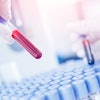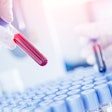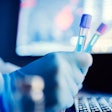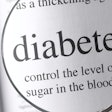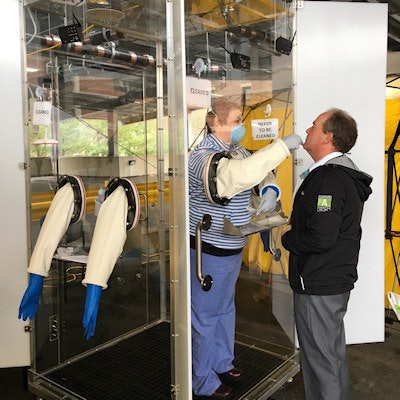
As the COVID-19 pandemic continues to evolve, hospitals and labs have had to get creative, overcome hurdles, and adapt their practices to perform safer COVID-19 testing. One solution is the Hexapod, which is a personal protective booth that allows healthcare providers to undertake swab testing without physically contacting patients.
The booths have been developed at Massachusetts General Hospital and Partners HealthCare, now the Mass General Brigham integrated healthcare system, which collaborated in their design and construction. The booths could be adapted for use in clinical laboratories.
In addition to protecting healthcare workers from infection, the Hexapods have improved the testing workflow at Massachusetts General Hospital to the point where the hospital has been able to increase the number of daily COVID-19 tests from 54 before the Hexapods were installed to up to 245 tests using the pods, according to Dr. Paul Currier, a physician at Massachusetts General Hospital.
 The Hexapod personal protective booth. Image courtesy of Dr. Paul Currier.
The Hexapod personal protective booth. Image courtesy of Dr. Paul Currier.Being able to test more people also has dropped the cost per test from $30.77 before the booths were installed to $7.44 when 245 tests are performed daily. On average with the Hexapods, the hospital has performed 93 tests per day.
But even this number has dropped the cost per test to $19.28, according to Currier. He noted that if the booths are used to the maximum of 245 tests per day, which is maximum capacity, they would save the hospital $1.8 million a year.
Based on a design used in South Korea, each Hexapod creates a fully protective barrier between the patient and provider. Patients approach the Plexiglas-sheeted booth from the outside. Healthcare providers can swab and test a patient while maintaining complete physical separation. The booths feature a high-efficiency particulate air (HEPA)-filtered positive pressure environment, three transparent partitions with sealed glove panels, a three-sided enclosure, and dividers for added privacy and rapid cleaning options.
"We used positive-pressure HEPA ventilation through the inside of the booth to protect the person doing the testing, providing an air flow that works against any potential coronavirus entering the booth. This added protection allows the person doing the testing to avoid using protective gowns and wearing an N-95 mask," Currier explained in an email. So, the booths essentially conserve personal protective equipment.
The booth's ability to switch from positive to negative air pressure makes it usable as a testing location and also as an environment in which patients can receive oxygen and nebulizer treatments while decreasing risk to caregivers, the hospital said in a statement. Communicating with patients is possible using a hands-free intercom system. Safety dividers ensure proper distance between patients.
Currier noted that under the original Hexapod design, patients were to be inside the booths, but that was changed to having people tested outside the booths so that testing could be completed more quickly. Also, initially the gloves used were thicker in order to protect the healthcare worker doing the testing as much as possible from COVID-19.
"We realized the dexterity with these gloves was insufficient to properly do testing," Currier explained.
At that point, the developers replaced the thicker gloves with nitrile gloves that fit onto sleeves extended from the booths. The new gloves allow for greater dexterity, he added. Additionally, other gloves can be added onto the outer gloves to optimize safety.
Drawing on an internal knowledge of testing, sanitizing, and workflow, developers designed, engineered, tested, and deployed the first working personal protective Hexapod booth to Massachusetts General Hospital within nine days. Hospital infection control personnel consulted with the developers and advised on cleaning protocols to use in between tests to quickly sanitize the plastic sheets, dividers, sleeves, gloves, and other areas of the booths, according to Dr. Kristian Olson, also a physician at Massachusetts General Hospital, and director of the MGH Springboard Studio, a group supported by the Massachusetts General Physicians Organization to engage patients, providers, and staff in human-centered design to make healthcare more user-friendly.
One challenge to constructing the booths, the physicians indicated, involved how supply chains were disrupted at the time, making it difficult to source the plastic sheets, gloves, no-touch intercoms, and filters. So the developers found local suppliers who could meet their needs.
Currier indicated the approximate cost of a Hexapod is $20,000, which may vary based on shipping and features. Currently, turnaround time stands at about 14 days.
Currier said customized versions of the booths have been produced for laboratory environments to protect researchers from equipment and processes that aerosolize the virus. Olson indicated that there has been thought given to adapting the booths for remote testing to meet the demand for testing and potentially to use them to vaccinate people.
